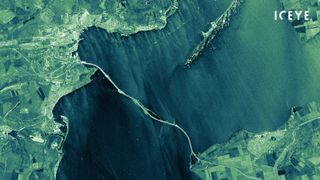
Ukraine is getting some more help from above in its fight against the ongoing Russian invasion.
The Ukrainian government will get access to imagery collected by the Finnish company ICEYE's constellation of synthetic aperture radar (SAR) satellites, as well as the full, dedicated services of one of those spacecraft, thanks to a new deal between ICEYE and the Serhiy Prytula Charity Foundation.
"ICEYE owns the most developed radar satellite imaging technology in the world as of today," Serhiy Prytula said in a statement Thursday (Aug. 18). "This agreement is a significant step in responding to the government of Ukraine’s urgent request for critical Earth observation data, and it will greatly benefit our armed forces."
Related: Russia's invasion of Ukraine as seen in satellite photos
Updates: Ukraine invasion's impacts on space exploration
Prytula established the Serhiy Prytula Charity Foundation in 2014, the year that Russia invaded and annexed the Ukrainian territory of Crimea. The foundation works to support the Ukrainian military and provides humanitarian aid throughout the nation, which is trying to fight off a large-scale Russian invasion that began on Feb. 24 of this year.
SAR satellites gather imagery in both darkness and light and can see through clouds, allowing users to monitor patches of Earth at all times and in all types of weather. Increased access to such images should help Ukraine significantly, said representatives of ICEYE, which has launched 21 SAR spacecraft to orbit to date.
"With this agreement, ICEYE further builds on its efforts to provide objective data and technological support to Ukraine," ICEYE CEO Rafal Modrzewski said in the same statement. "We firmly believe SAR technology and its capabilities will continue to add significant value to the government of Ukraine, now enabled by the work of the Serhiy Prytula Charity Foundation."
Get the Space.com Newsletter
Breaking space news, the latest updates on rocket launches, skywatching events and more!
ICEYE will continue to operate the SAR satellite that will be fully tasked for Ukraine work, company representatives said. Financial terms of the newly announced deal were not disclosed.
Other private companies are helping Ukraine and the world keep tabs on the Russian invasion as well, albeit in a less formal fashion. For example, satellites operated by Maxar, Planet, BlackSky, Capella Space (which, like ICEYE, specializes in SAR imagery) and other firms have captured photos that reveal details of Russian troop movements and show which Ukrainian cities are in greatest need of humanitarian assistance.
Mike Wall is the author of "Out There" (Grand Central Publishing, 2018; illustrated by Karl Tate), a book about the search for alien life. Follow him on Twitter @michaeldwall. Follow us on Twitter @Spacedotcom or on Facebook.
Join our Space Forums to keep talking space on the latest missions, night sky and more! And if you have a news tip, correction or comment, let us know at: community@space.com.

Michael Wall is a Senior Space Writer with Space.com and joined the team in 2010. He primarily covers exoplanets, spaceflight and military space, but has been known to dabble in the space art beat. His book about the search for alien life, "Out There," was published on Nov. 13, 2018. Before becoming a science writer, Michael worked as a herpetologist and wildlife biologist. He has a Ph.D. in evolutionary biology from the University of Sydney, Australia, a bachelor's degree from the University of Arizona, and a graduate certificate in science writing from the University of California, Santa Cruz. To find out what his latest project is, you can follow Michael on Twitter.
